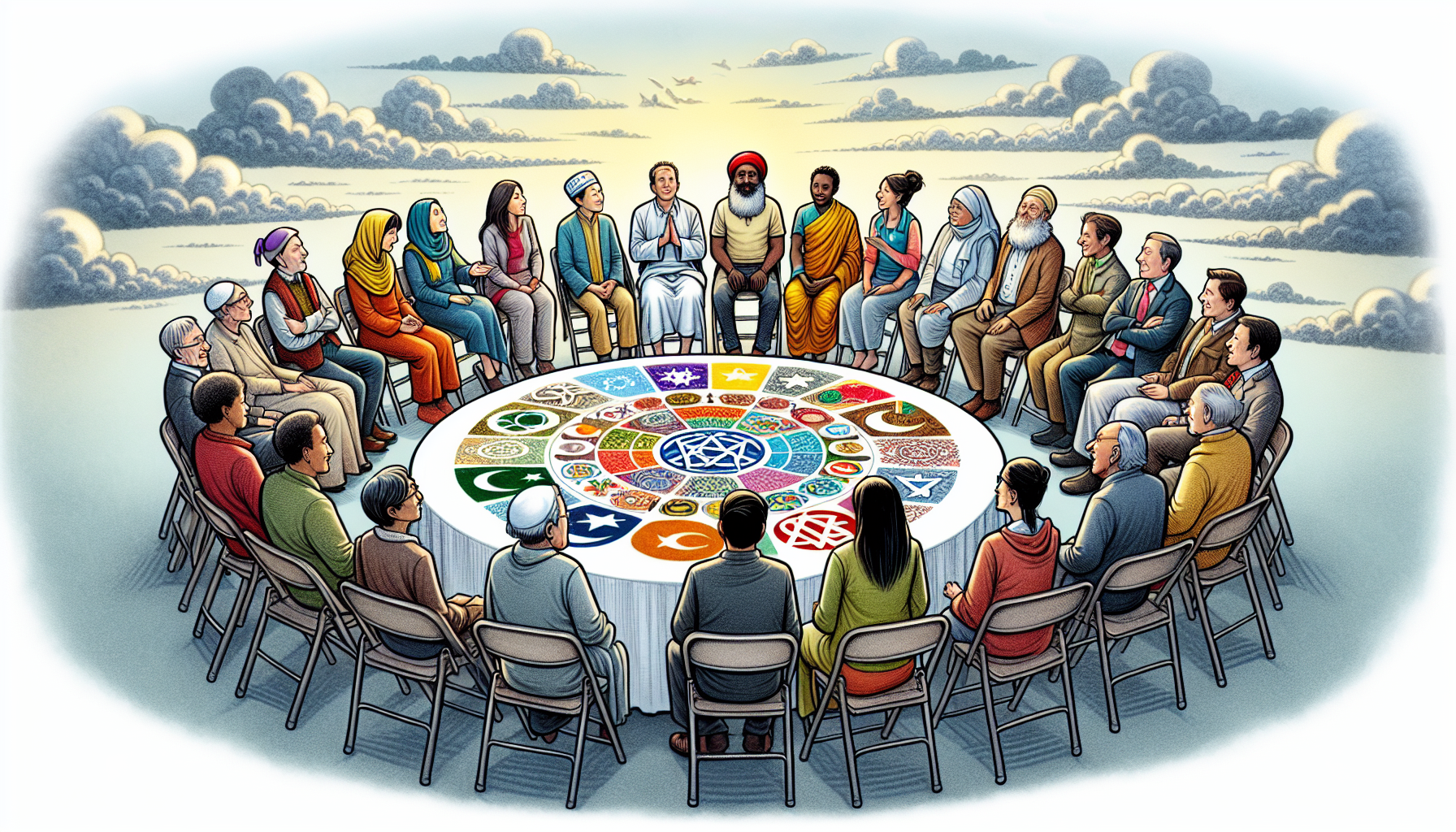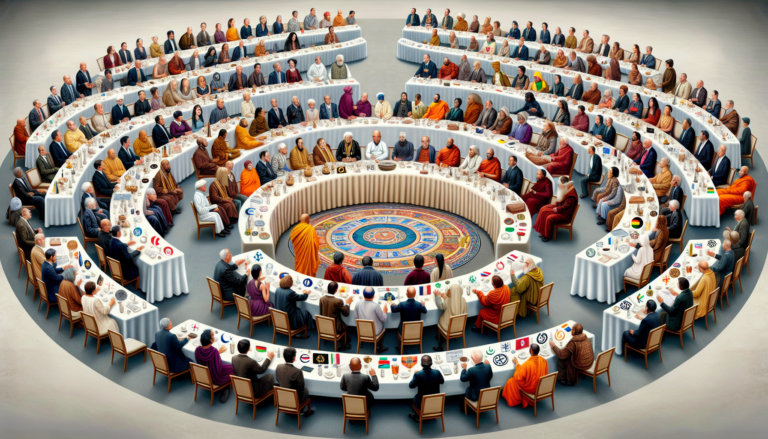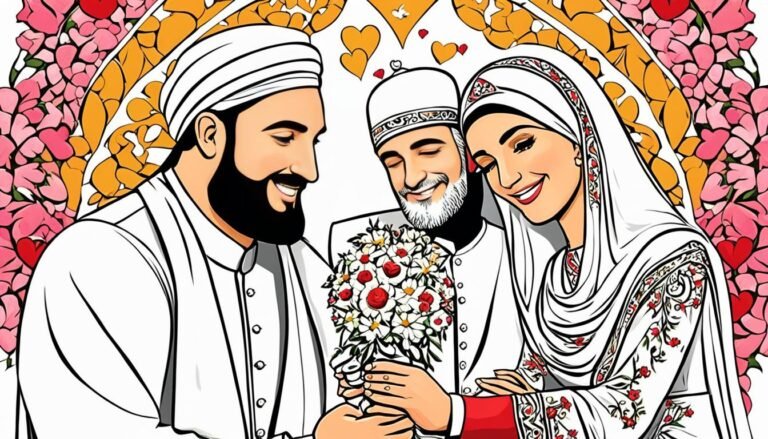Promoting Peace: The Essentiality of Interreligious Dialogue
Understanding Interreligious Dialogue
Interreligious dialogue is all about bringing folks from different religious backgrounds together to chat, learn, and build respect. It’s like a big, friendly neighborhood meeting where everyone gets to share their stories and beliefs. Let’s break down what interreligious dialogue is, why it matters, and the different ways people can engage in these conversations.
What is Interreligious Dialogue?
Interreligious dialogue, or interfaith dialogue, is when people from various religions come together to talk about their beliefs, practices, and values. It’s not about converting anyone or giving up your own faith. Instead, it’s about understanding each other and finding common ground. Think of it as a way to make new friends and learn about their lives.
The Dicastery for Promoting Integral Human Development describes interreligious dialogue as a process that promotes respect, understanding, and teamwork among people of different faiths. It’s about being open to others’ beliefs while staying true to your own.
The goal of interreligious dialogue is to respect diversity, fight against religious prejudice, and help build a more inclusive and peaceful society. By talking and listening, people can clear up misunderstandings, challenge stereotypes, and get a better grasp of different religious traditions.
Different Types of Interfaith Dialogues
There are several ways to engage in interreligious dialogue, each with its own focus. Here are four types commonly recognized in the Catholic tradition:
-
Life Experiences: This type of dialogue is all about sharing personal stories and experiences related to faith. It’s a chance for people to talk about how their beliefs shape their lives and values. Imagine sitting around a campfire, sharing stories that matter to you.
-
Work and Action for the Community: Here, the focus is on working together to tackle social issues and help the community. It’s about rolling up your sleeves and collaborating on projects that make a difference. Think of it as a team effort to improve the neighborhood.
-
Theological Exchange: This dialogue dives into discussions about religious doctrines and beliefs. It’s a deeper conversation where people can explore their own faith and learn about others’. Picture a friendly debate where everyone walks away with new insights.
-
Religious Experience: This type centers around sharing religious rituals and spiritual practices. It’s a way to explore the similarities and differences in how people practice their faith. Imagine attending a friend’s religious ceremony and finding common threads in your own practices.
By engaging in these different types of dialogues, people can have meaningful conversations, promote understanding, and work towards peace and unity.
Interreligious dialogue is like building bridges between different communities. By talking and listening to each other, we can create a world that celebrates our shared humanity and promotes peace. So, let’s keep the conversation going and make our world a little more connected.
Why Interfaith Dialogue Matters
Interfaith dialogue is like a secret sauce for peace, understanding, and unity among different religious communities. When folks from various faiths sit down and chat, they break down walls, smash stereotypes, and find ways to work together.
Spreading Peace and Understanding
Interfaith dialogue is a game-changer for peace. Despite what you might hear, religion often brings people together more than it divides them. These conversations can be a goldmine for promoting understanding and making peace, tapping into the peacemaking vibes that many religions share (USIP). It’s a chance for people from different backgrounds to share their stories and find common ground.
When people talk, they get to know each other’s beliefs, practices, and values better. This helps clear up misunderstandings and busts stereotypes, making room for empathy and respect. By fostering mutual understanding and respect, interfaith dialogue helps create a more peaceful and harmonious society.
Building Unity and Teamwork
Interfaith dialogue is also a powerhouse for unity and teamwork among different religious communities. It gives people a chance to connect on a personal level, build trust, and form lasting relationships. By engaging deeply at all levels, including the grassroots, interfaith dialogue can use religious rituals and symbols to promote peace (USIP).
When religious communities team up, they can tackle shared issues and work for the common good. Many interfaith groups focus on big topics like religious freedom, economic justice, helping the homeless, and fighting for racial justice (YCDiversity). By joining forces, people from different faiths can pool their resources and efforts to tackle social challenges and make a real difference in their communities.
Sure, interfaith dialogue has its bumps and risks, but with an open mind and a genuine desire to understand, it can build unity, forge lasting connections, and contribute to peacebuilding. By connecting religious communities, interfaith dialogue helps create a more inclusive and harmonious world.
Want to see interfaith dialogue in action? Check out our sections on workshops and seminars, community outreach and events, inclusive events and celebrations, and service projects and advocacy.
Practical Ways to Boost Interfaith Dialogue
Want to bring folks from different faiths together and build some real understanding? Here are some down-to-earth ideas: workshops and seminars, plus community outreach and events.
Workshops and Seminars
Think of workshops and seminars as the ultimate meet-and-greet for different religions. These gatherings let people share their beliefs, practices, and experiences. It’s like a cultural exchange, but with a focus on faith. Topics can range from religious diversity to interfaith cooperation and shared values.
Invite religious leaders, scholars, and everyday practitioners from various faiths. This way, everyone gets a peek into different religious perspectives. Plus, these events can tackle common issues communities face, offering a chance for teamwork and problem-solving. You can host these at local community centers, schools, or religious places.
Community Outreach and Events
Getting out into the community and organizing events is another great way to promote interfaith dialogue. By connecting with different religious groups, you can build relationships, trust, and a sense of unity. Here are some ideas:
-
Festivals and Celebrations: Plan events that celebrate the diversity of different faiths. Think religious holidays, rituals, arts, music, and food. These gatherings offer a chance for people to learn about and appreciate various cultures and traditions. Creating a safe and respectful space for dialogue can help break down barriers and build connections.
-
Service Projects and Advocacy: Team up with people from different faiths to tackle common challenges in the community. Whether it’s providing food, clothing, shelter, or education to those in need, these projects show that compassion, kindness, and social justice are values shared across religions. Working together on advocacy initiatives can also amplify efforts for social change, human rights, and peace.
Don’t forget the power of the internet! Use online platforms to share stories, resources, and information about different faiths. Social media can spread positive narratives and promote interfaith understanding. Always be open to feedback and ready to tweak your efforts for better results.
By diving into workshops, seminars, community outreach, and events, you can actively engage in interfaith dialogue. These efforts help build bridges of peace and unity among diverse religious communities.
Building Bridges Through Dialogue
Creating understanding and promoting peace between different religious communities starts with building bridges through dialogue. Let’s dive into two key ways to make this happen: inclusive events and celebrations, and service projects and advocacy.
Inclusive Events and Celebrations
One great way to spark interfaith dialogue and understanding is by organizing events and celebrations that highlight the diversity and richness of various faith traditions. These gatherings offer a chance for people from different religious backgrounds to come together, learn, and appreciate each other’s cultures.
Think about interfaith festivals, workshops, panels, or tours that showcase religious holidays, rituals, arts, or foods from different communities. These events let folks experience and engage with traditions outside their own, fostering mutual respect and understanding. It’s crucial to create a safe and respectful space for dialogue, where everyone feels comfortable sharing their perspectives, asking questions, and learning from one another.
To make these events a hit, invite speakers, experts, or leaders from different faiths to share their insights and experiences. This helps attendees gain a deeper understanding of different belief systems, practices, and values, fostering a richer appreciation of one another.
Service Projects and Advocacy
Getting involved in service projects and advocacy initiatives that tackle common community challenges is another powerful way to promote interfaith dialogue and understanding. By teaming up with other faith groups, individuals can work together to provide essential support and resources to those in need.
Service projects might include providing food, clothing, shelter, or education to those who need it most. By joining forces with other faith groups, people can pool their resources and expertise to make a bigger impact. These collaborative efforts showcase the positive outcomes that can come from interfaith cooperation and solidarity.
Beyond service projects, engaging in advocacy work can address social change, human dignity, and peace on both local and global levels. By standing up for justice, equality, and respect for all, individuals can work towards a more inclusive and harmonious society. Through joint efforts, faith communities can amplify their voices and drive positive change.
To keep the conversation going and build on these efforts, use social media to share positive stories about different religions working together. This creates a virtual space where people can engage in conversations, share experiences, and build connections beyond physical events.
By actively participating in inclusive events and celebrations, as well as engaging in service projects and advocacy initiatives, individuals can help promote interfaith dialogue and understanding. These efforts lay the foundation for a more peaceful and harmonious society, where people from different faith backgrounds can come together, learn from each other, and work towards common goals.







